
Authored by MinutesLink — meeting minutes AI for remote calls.
Written with support from MinutesLink — a free AI notetaker for online meetings.
These customizable templates work seamlessly across platforms - download them for Microsoft Word, access them through Google Docs, or save them as PDFs for easy sharing. Each meeting agenda template includes pre-built sections, time allocations, and professional formatting to help you create agendas that keep participants engaged and meetings on track.
Using a meeting agenda template creates consistency across meetings. It helps participants prepare in advance, keeps discussions on track, and ensures decisions and action items don’t get lost. Teams that use structured agendas spend less time clarifying what was decided after the meeting.
Different meeting types require different approaches. A project kickoff demands comprehensive planning sections, while weekly one-on-ones need space for personal development discussions. These examples demonstrate how to structure agendas for maximum effectiveness across various meeting scenarios.
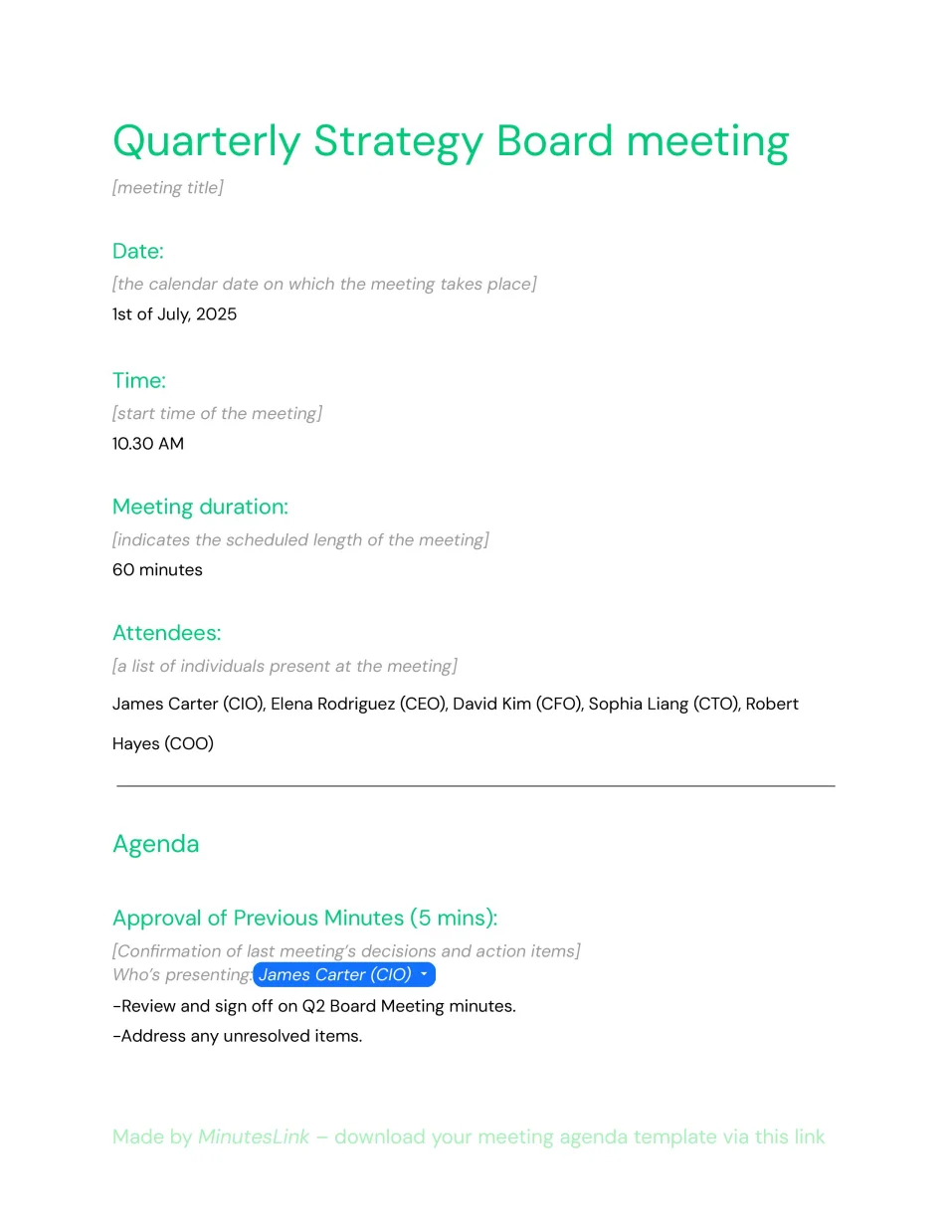
Board meetings require formal structure and comprehensive coverage of governance topics. This board meeting agenda template includes sections for executive reports, financial reviews, strategic initiatives, and formal voting items. The format ensures compliance with corporate governance requirements while maintaining professional standards that board members expect.
Key sections include:
Board agendas must balance operational oversight with strategic thinking. They provide sufficient detail for informed decision-making without overwhelming directors with excessive operational minutiae. Effective board meeting agenda templates incorporate time management principles that respect busy schedules while ensuring thorough coverage of critical governance topics.
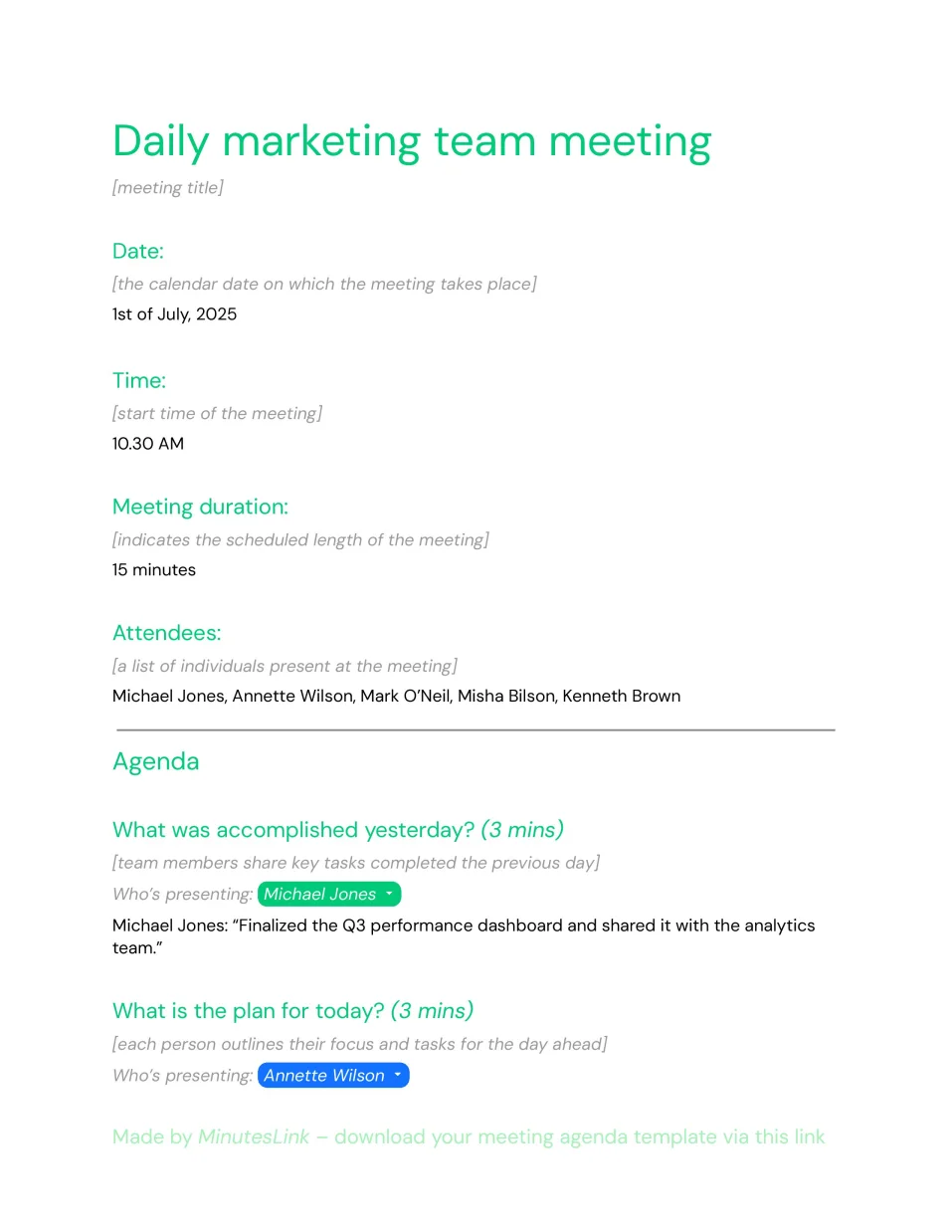
Daily standups thrive on brevity and focus. This streamlined agenda keeps discussions moving while ensuring every team member shares essential updates. The structure promotes accountability without overwhelming busy schedules.
Essential elements:
The beauty of daily team meetings lies in their consistency and efficiency. When teams use the same agenda structure every day, participants know exactly what to expect and can prepare their contributions accordingly. This predictability reduces meeting anxiety and increases participation from quieter team members who benefit from structured formats.
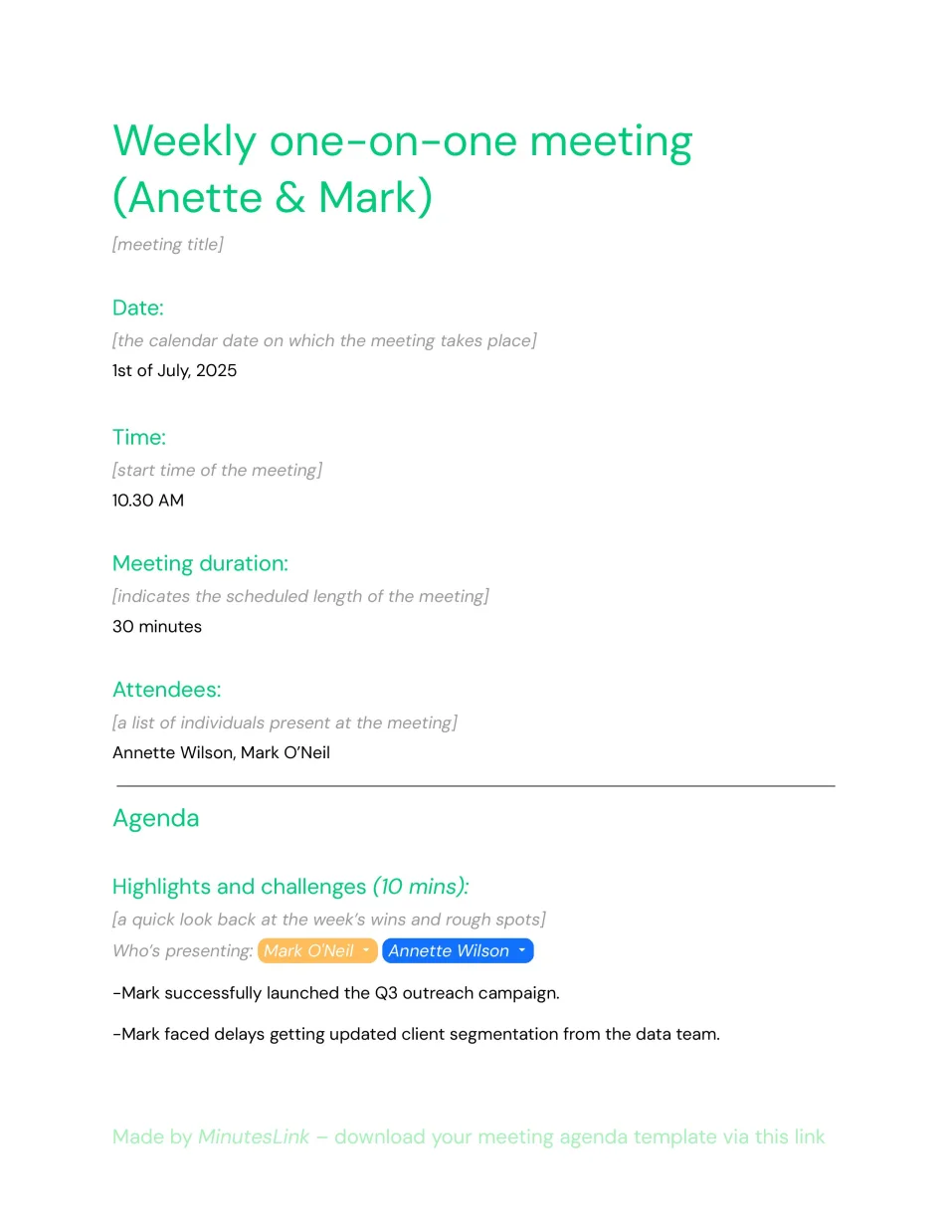
One-on-one meetings build stronger working relationships when they follow a consistent structure. This template balances performance discussions with professional development opportunities, creating space for both immediate concerns and long-term growth planning.
Core components:
Weekly one-on-ones represent some of the most valuable time managers invest in their team members. The agenda template ensures these conversations remain productive and meaningful rather than devolving into casual check-ins that miss opportunities for genuine development and relationship building.
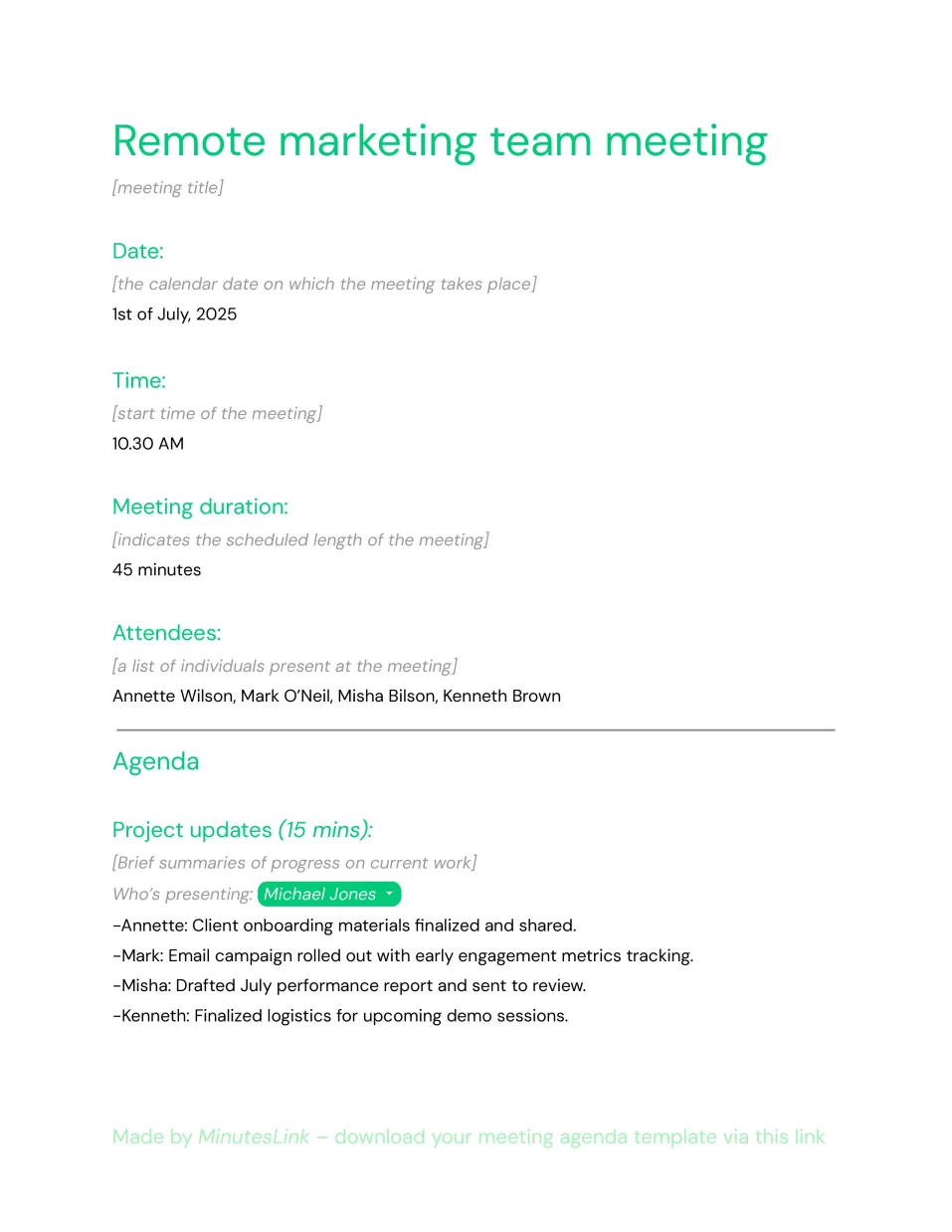
Staff meetings bring entire departments together, requiring careful balance between information sharing and collaborative discussion. This staff meeting agenda template accommodates diverse topics while respecting everyone's time constraints.
Structured sections:
Staff meetings serve multiple purposes beyond simple information distribution. They build team cohesion, align departmental priorities, and create forums for collaborative problem-solving. The agenda template structure ensures these broader objectives receive attention alongside operational updates.
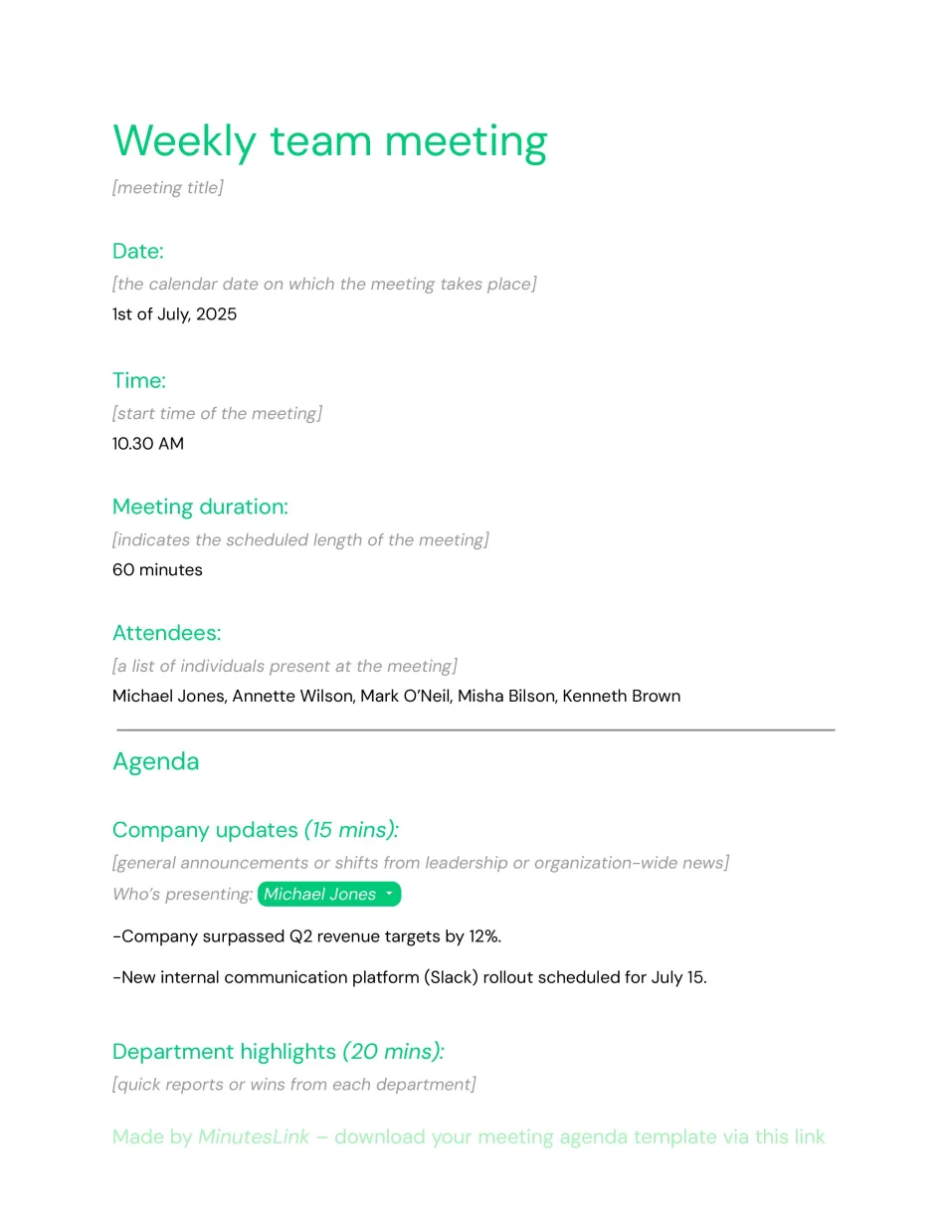
Team meetings focus on collaboration and project coordination. This team meeting agenda template provides frameworks for status updates, problem-solving sessions, and planning discussions that keep projects moving forward effectively. A clear agenda also makes it easier to capture meeting notes and action items during the meeting.
Primary elements:
Successful team meetings create shared understanding and collective commitment to project outcomes. The agenda template facilitates these goals by providing structured opportunities for open communication and collaborative decision-making that respects diverse perspectives while maintaining forward momentum.
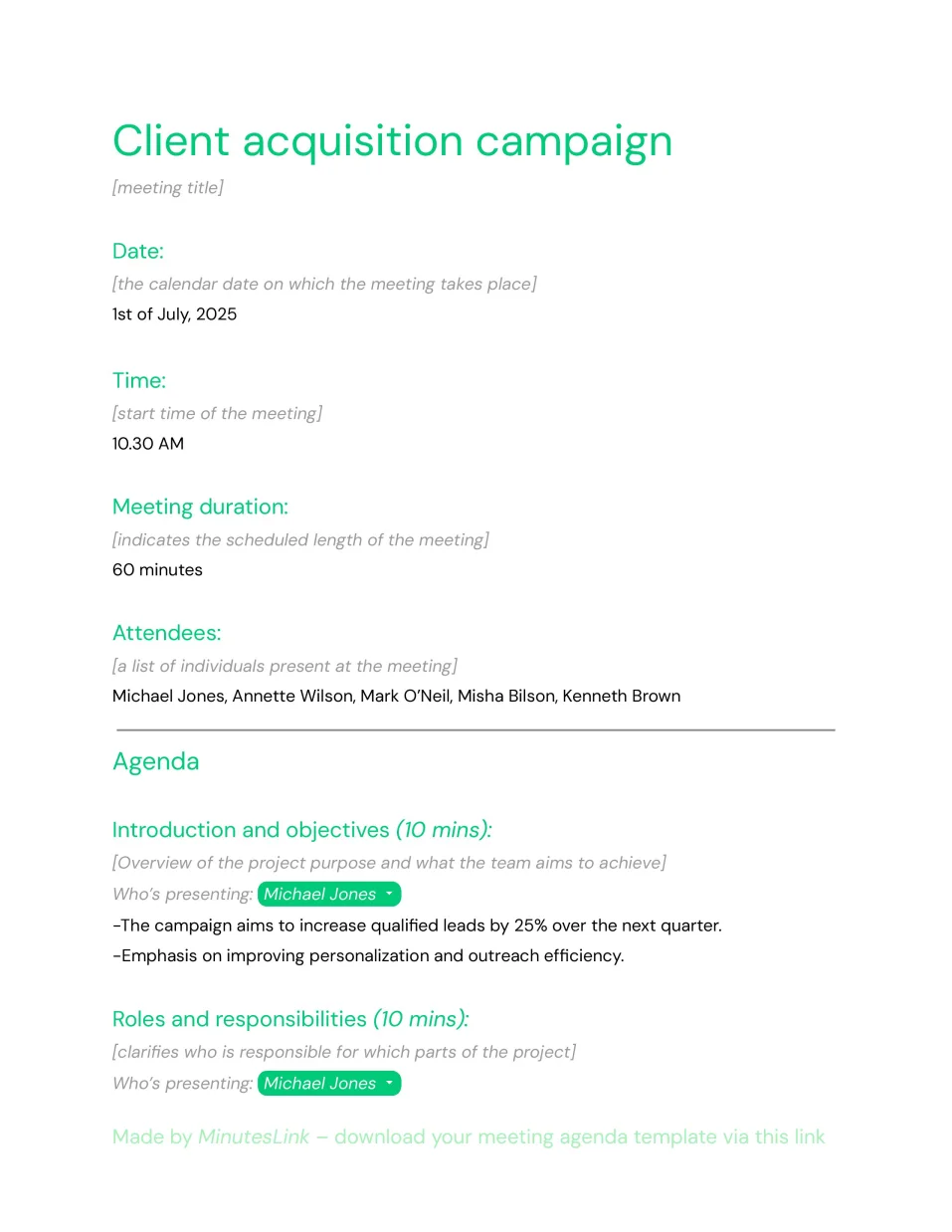
Project kickoffs set the foundation for successful execution. This comprehensive template ensures all stakeholders understand objectives, timelines, roles, and success criteria before work begins. Proper kickoff planning prevents costly misunderstandings later.
Critical sections:
Project kickoff meetings represent crucial investment opportunities that pay dividends throughout project lifecycles. The agenda template ensures comprehensive coverage of essential topics while creating shared understanding among diverse stakeholders who may have different backgrounds, expectations, and working styles.
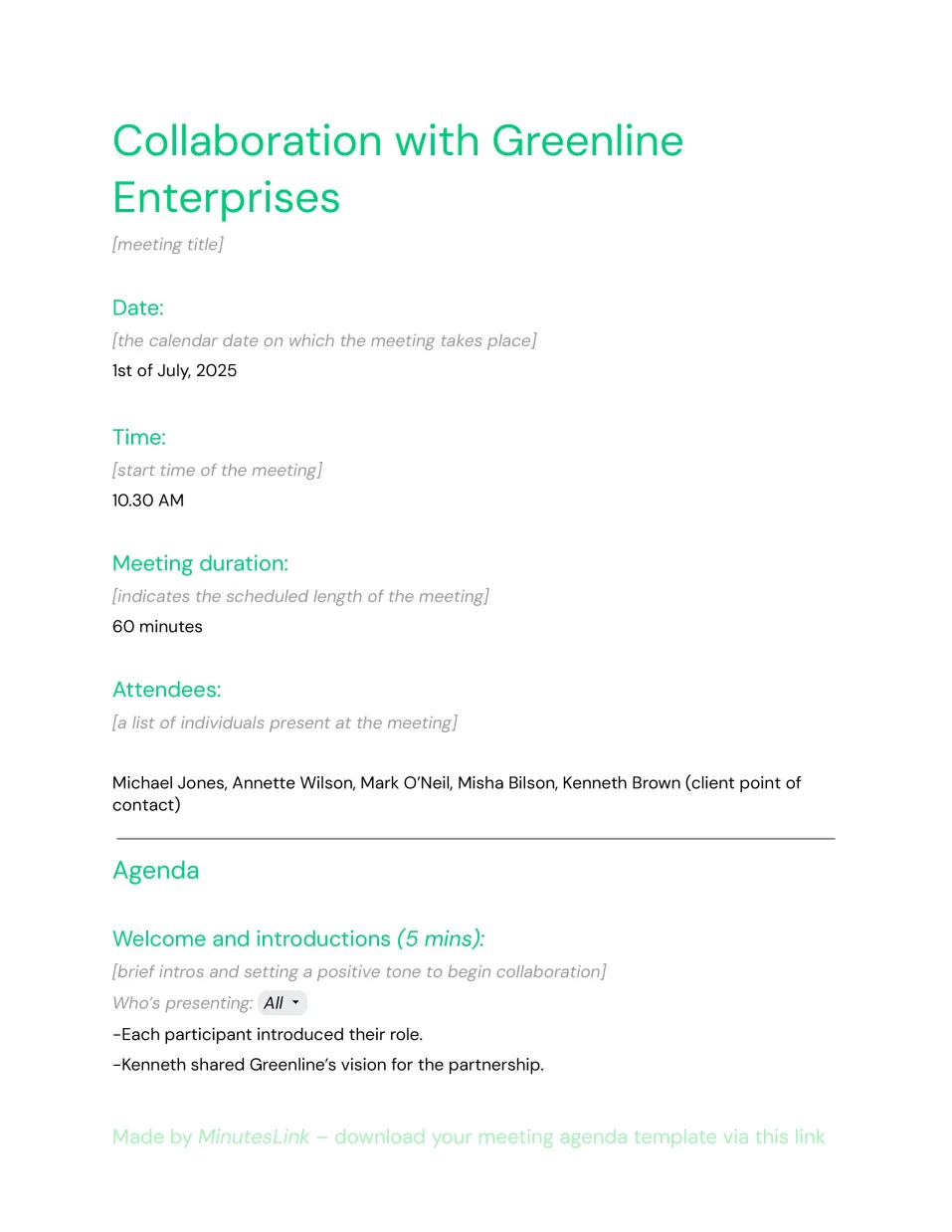
Client relationships start strong with well-orchestrated kickoff meetings. This template guides initial conversations, establishes expectations, and creates collaborative frameworks that support long-term partnerships.
Foundation elements:
New client relationships benefit enormously from structured beginning conversations that establish trust, clarify expectations, and demonstrate professionalism. The agenda template ensures nothing important gets overlooked while creating positive first impressions that set the stage for successful long-term partnerships.
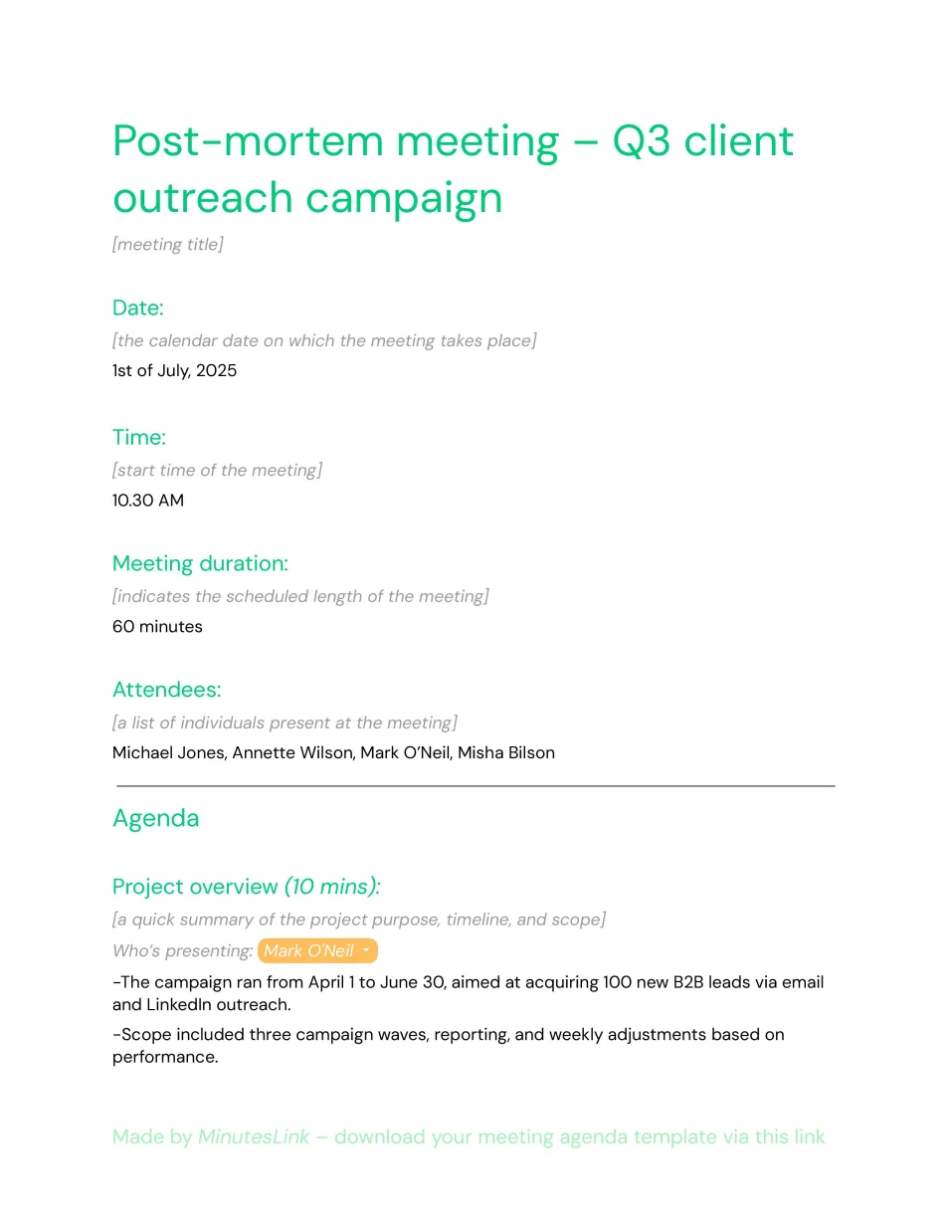
Learning from completed projects requires structured reflection. This post-mortem template facilitates honest discussions about successes, challenges, and improvement opportunities without assigning blame or criticism.
Reflective components:
Post-mortem meetings transform project experiences into organizational learning when properly facilitated. The agenda template creates safe spaces for honest reflection while ensuring insights get captured and applied to improve future project outcomes.
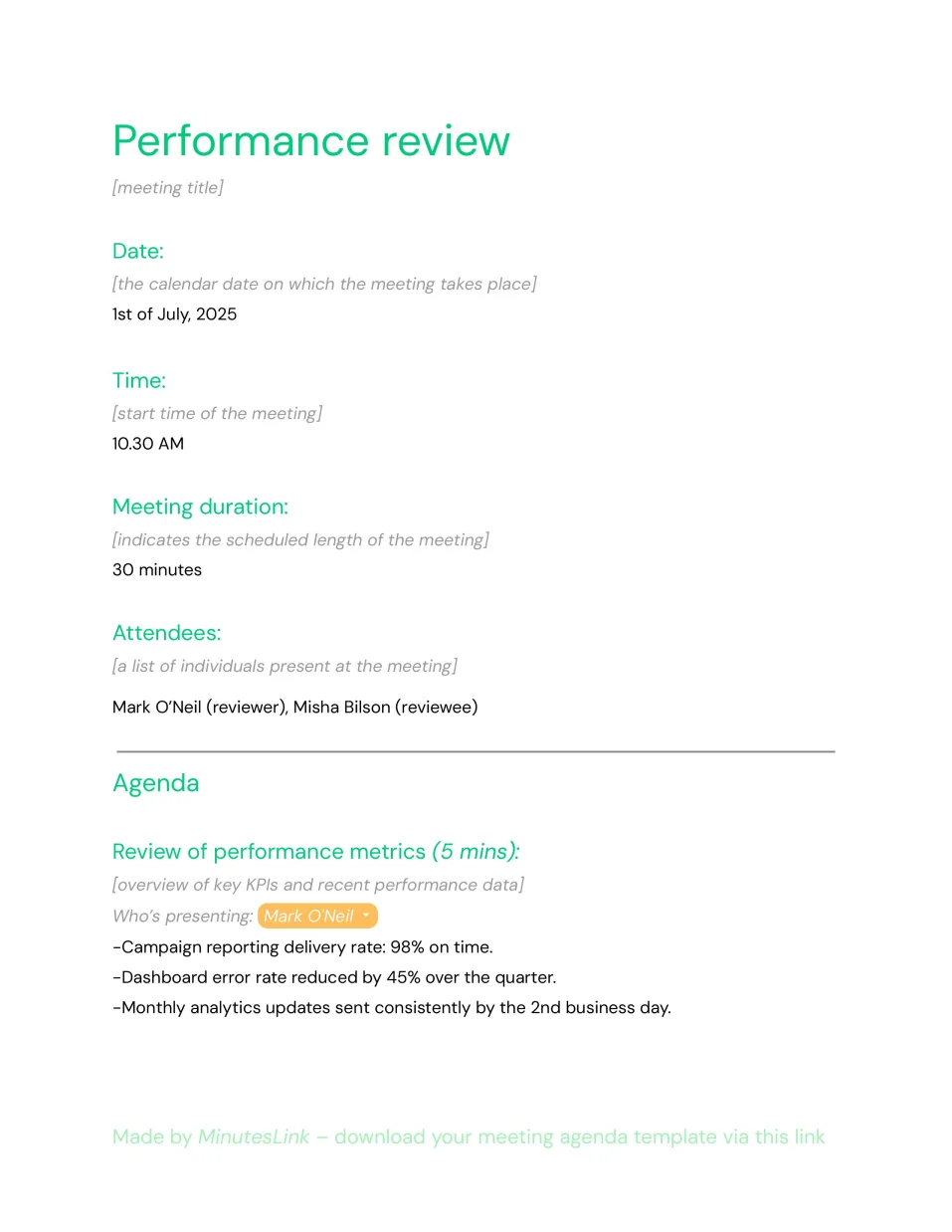
Performance reviews become more productive with clear structure and preparation guidelines. This template ensures comprehensive coverage of achievements, development areas, and future planning while maintaining constructive dialogue throughout the process.
Evaluation framework:
Performance review meetings significantly impact employee engagement and retention when conducted thoughtfully. The agenda template provides frameworks for meaningful conversations that recognize achievements, address development opportunities, and strengthen working relationships between managers and team members.
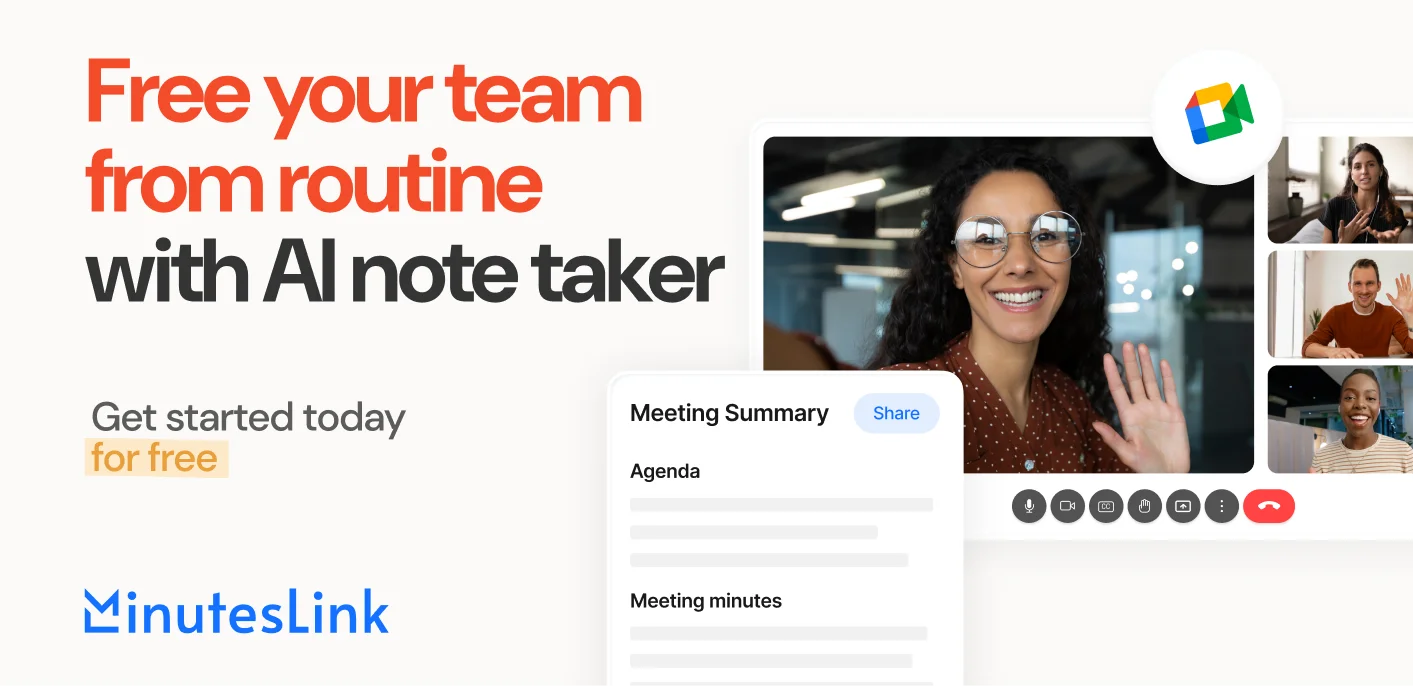
A meeting agenda sets the direction, but outcomes depend on what happens next. Tools like MinutesLink help teams capture meeting notes, decisions, and action items automatically, so agendas turn into documented results instead of forgotten plans.
Try MinutesLink today and transform the way you manage meetings!
A meeting agenda serves as a roadmap for productive meetings, outlining discussion points, time allocations, and desired outcomes ahead of time to ensure the conversation stays focused and efficient that outlines discussion points, time allocations, and expected outcomes. Think of it as your meeting's GPS - it prevents wandering conversations and helps all attendees stay on the same page.
Effective agendas do more than list topics; they set clear expectations, provide context, and create accountability frameworks that help responsible parties prepare meaningful contributions. When properly crafted, agendas transform meetings from time-wasting obligations into valuable collaboration opportunities that drive organizational progress and enable follow-through on action items.
The psychology behind agenda effectiveness relates to human cognitive patterns and social dynamics. People perform better in structured environments where expectations are clear and preparation is possible. Agendas provide this structure while accommodating different personality types and communication preferences that exist within diverse teams.
Modern agenda design incorporates principles from behavioral psychology, project management, and organizational development. The best meeting agenda templates reflect these insights by including elements that promote engagement, facilitate decision-making, and create accountability mechanisms that extend beyond the meeting itself, supporting productive meetings and future meetings alike.
Understanding the difference between agenda discussion items and agenda objectives helps create more focused meetings. Discussion items represent what will be covered, while objectives clarify what desired outcomes the meeting should achieve. The most effective agendas clearly communicate both elements to help participants understand their role in achieving results and review progress.
Writing compelling agendas requires balancing thoroughness with brevity while considering participant needs and meeting objectives. Start by defining clear outcomes - what specific results do you need from this gathering? Then work backward to identify necessary discussion points and time requirements.
Begin with essential logistics: meeting date, time, location, and list of attendees. Follow with a brief meeting purpose statement that clarifies why everyone's time investment matters. This context helps participants understand the meeting's importance and their role in achieving successful outcomes.
Structure agenda items in logical order, typically moving from informational updates to decision-making discussions. This progression allows the project team and other responsible parties to build shared understanding before tackling critical issues that require collaborative thinking and problem-solving.
Assign realistic time limits to each section, always building in buffer time for unexpected discussions. Most facilitators underestimate time requirements, particularly for decision-making topics that require thorough analysis and group consensus. Adding 15-20% buffer time prevents rushed conclusions that often result from overly optimistic scheduling.
Include pre-meeting preparation requirements so participants arrive ready to contribute meaningfully. Specify what materials to review, what questions to consider, or what information to gather. This preparation dramatically improves meeting quality while reducing time spent on information sharing that could happen asynchronously.
End agendas with clear next steps, actionable plans, and follow-up expectations. This forward-looking orientation helps participants understand how the meeting connects to broader organizational objectives and their individual responsibilities for implementing decisions and maintaining momentum.
Consider the meeting's place within larger organizational rhythms and project cycles. Agendas should reflect whether the meeting represents a beginning point, milestone check, or conclusion phase. This context influences how deeply to explore topics and what level of detail is appropriate for different agenda items. The best agendas also define what decisions or action items should come out of the meeting.
Templates provide excellent starting points, but customization makes them truly effective for specific organizational needs and team dynamics. Begin by evaluating typical meeting challenges - do discussions frequently run long? Do participants arrive unprepared? Do action items get forgotten after meetings conclude?
Modify template sections to address recurring patterns and pain points. Add preparation reminders if people consistently arrive uninformed about agenda topics. Include stricter time controls if discussions regularly exceed allotted time and prevent coverage of important agenda items. Create dedicated parking lot sections for off-topic issues that arise during focused discussions.
Consider organizational culture when customizing agenda templates. Formal environments benefit from structured, detailed agendas with specific protocols and clear hierarchy. Creative teams might prefer flexible formats that accommodate spontaneous brainstorming while maintaining productive focus. The best templates reflect how teams actually work together rather than imposing artificial constraints.
Adapt templates for different meeting formats and technologies. Virtual meetings require different timing and interaction considerations than in-person gatherings. Hybrid meetings with both remote and local participants need special attention to ensure equal participation opportunities and clear communication protocols.
Build template variations for different meeting frequencies and purposes. Daily standups need different structures than monthly strategic reviews. Quarterly business reviews require more comprehensive frameworks than weekly operational updates. Having template options prevents the inefficiency of forcing every meeting into identical formats.
Include customization elements that reflect participant preferences and accessibility needs. Some team members contribute better with agenda ahead and detailed preparation requirements. Others prefer more spontaneous discussion formats. Effective agenda templates accommodate these differences without compromising meeting effectiveness.
Test template modifications with regular participants and gather feedback about what works well and what creates confusion or frustration. Continuous improvement based on user experience ensures agenda templates remain valuable tools rather than bureaucratic obstacles to productive collaboration.
Well-planned agendas prevent the productivity drain that poorly managed meetings create throughout organizations. Without clear structure, discussions meander aimlessly, important discussion points get overlooked entirely, and participants leave feeling frustrated rather than energized about their work and collaborative relationships.
Agendas create psychological safety by letting participants prepare appropriately for meaningful contributions. When people know what to expect, they contribute more confidently and thoughtfully. This preparation leads to higher-quality discussions and better decision-making outcomes that reflect diverse perspectives and thorough analysis.
From a practical standpoint, agendas help organizations respect time boundaries and resource investments. They demonstrate professionalism to clients and stakeholders while creating documentation trails that support accountability and follow-through on commitments made during collaborative discussions.
Research consistently demonstrates that meetings with structured agendas produce measurably better outcomes than unstructured gatherings. Participants report higher satisfaction levels, clearer understanding of next steps, and greater confidence in their ability to implement decisions reached through collaborative processes.
The ripple effects of effective agenda use extend far beyond individual meetings. Organizations that consistently use well-crafted agendas develop stronger communication cultures, more efficient decision-making processes, and higher levels of employee engagement. These benefits compound over time to create significant competitive advantages.
Agenda use also supports organizational learning and knowledge management. When meetings follow consistent structures, it becomes easier to identify patterns, track current status over time, and build institutional memory that survives personnel changes and organizational transitions.
The financial impact of agenda use becomes apparent when calculated across entire organizations. Time savings from more efficient meetings multiply across hundreds or thousands of gatherings annually. Improved decision quality reduces costly mistakes and rework. Higher participant engagement leads to better implementation of meeting outcomes.
Modern remote and hybrid work environments make agenda use even more critical. Virtual meetings require more structure to maintain engagement and prevent the multitasking that diminishes collaboration quality. Clear agendas help remote participants stay focused and contribute meaningfully despite potential distractions in their physical environments.
A strong meeting agenda is the first step toward productive meetings. When combined with clear notes and tracked action items, it helps teams move from discussion to execution with less friction.